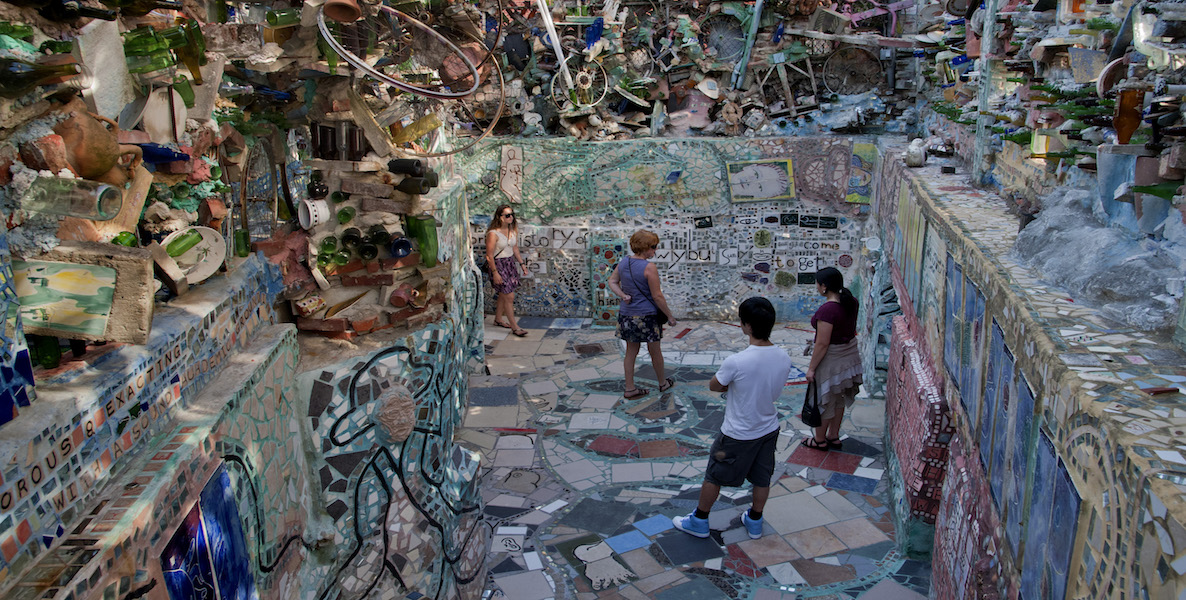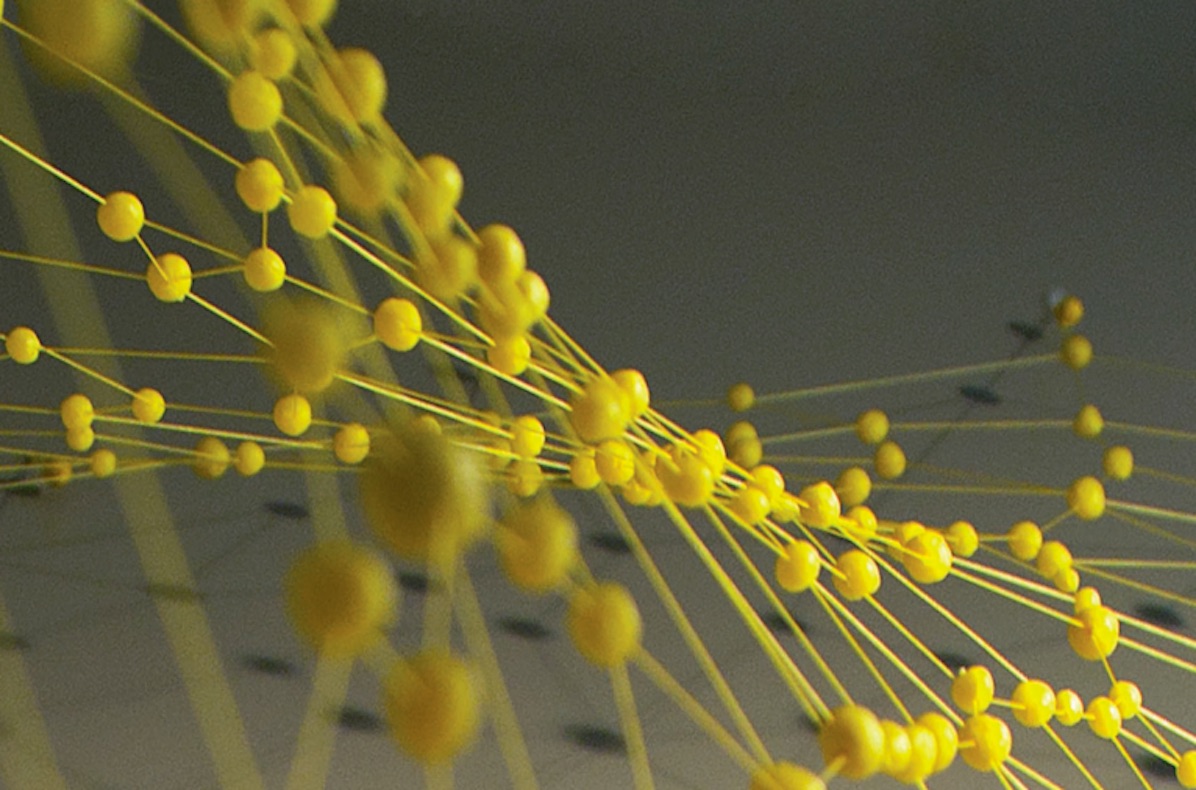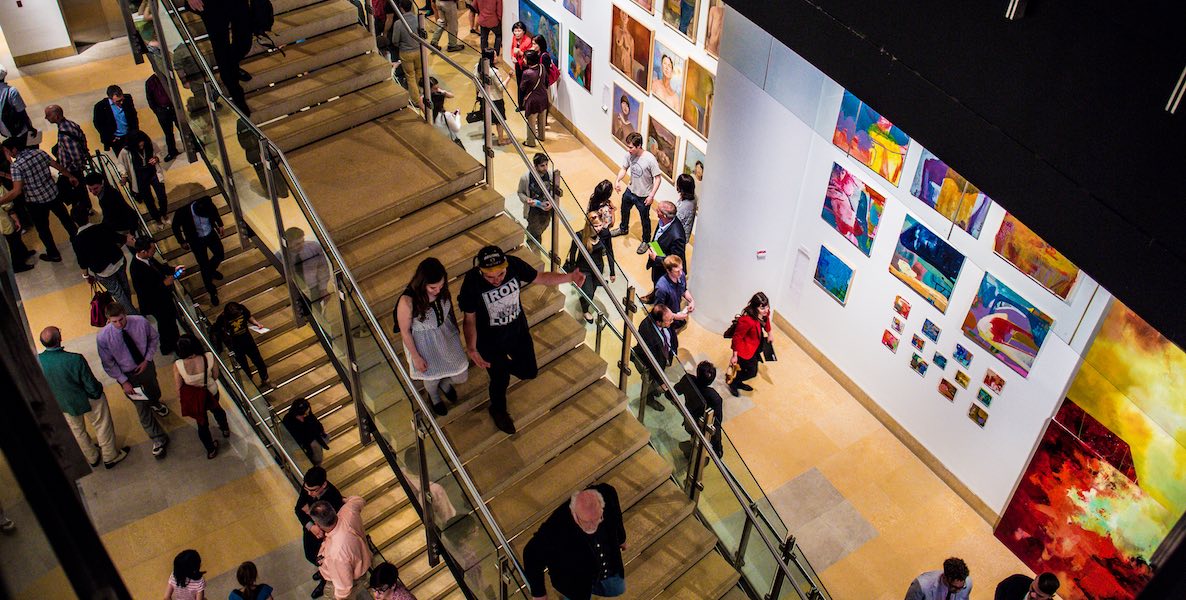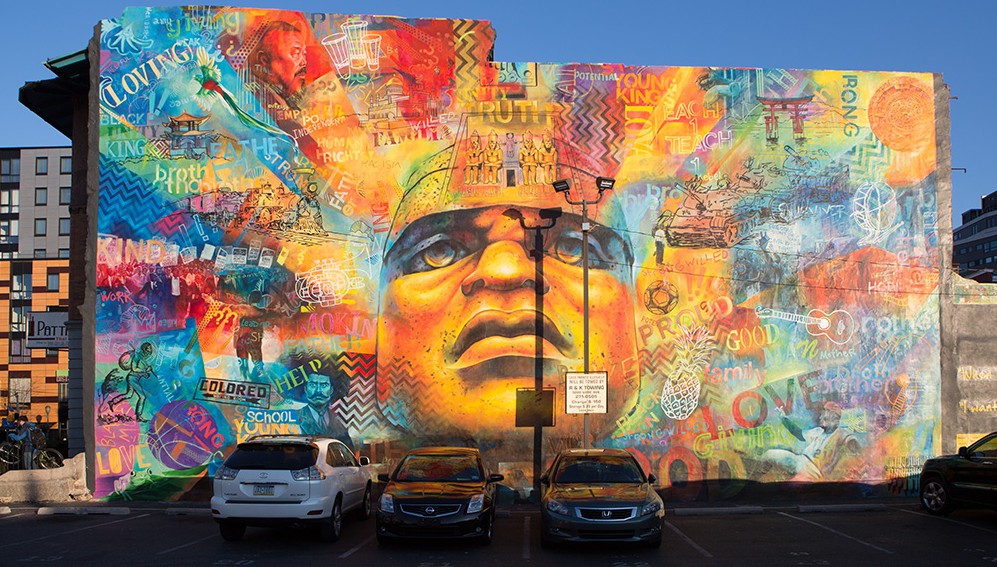Visitors to the Barnes Foundation last Tuesday night were treated to some little-known facts about the institution and its founder, Albert C. Barnes.
“Barnes was a fierce feminist,” explained tour guide Shani Akilah (who uses they/them pronouns). They explained that not only did Barnes respect the female form rather than objectify it, he also read prominent feminist theorists such as Betty Friedan, bell hooks, and Angela Davis. “He actually was a nudist as well,” they added.
Akilah also related three attempts made on Barnes’ life by his enemies: The first involved a poisoned dinner; the second a BDSM play party attack; and the third a narrowly-dodged dagger.
Of course, none of these anecdotes are true.
![]()
Akilah’s tour was part of the Barnes Jawn(t)s series, an experiment in improvisation led by various community activists and cultural figures intended to open up the museum’s collection to broader audiences and interpretations.The tours began on July 17 and are set to run six weeks, until August 21. Besides Akilah, co-founder of the Black and Brown Workers Cooperative, guides include Elicia Gonzales, executive director of the Women’s Medical Fund; tattoo artist/activist Jasmine “Jas” Morrell; and Arielle Johnson, owner of Amalgam Comics & Coffeehouse.
The Jawn(t)s came into being when Daniel Park, one of the members of Obvious Agency—an interactive design collaboration—reached out to Shelley Bernstein, now Consulting Creative Technologist at the Barnes. He came to the Foundation expecting to discuss his background and work. So he was blindsided when Bernstein asked: “If you were going to take over the Barnes what would you do?”
“One of the reasons why there’s no signage on the walls, why there are no didactics to tell people what to see, is that Dr. Barnes actually did want people to create their own stories and create their own ties between the pieces that are in the collection,” says Kathleen Greene, the museum’s Curator of Public Programs.
It took a while for Park to formulate an answer, a process which began with several trips through the collection and a meditation on what rules, “spoken and unspoken,” govern the space. Those rules, according to Park, include the need to venerate the artwork on the walls; maintain a certain composure in the galleries; and speak quietly. Faced with such an atmosphere, Park found himself moving through the galleries and making up stories for the artworks as he went—a practice he realized could be turned into a larger-scale, more collaborative exercise.
This act of making up stories is one that fits squarely within Albert Barnes’ vision for his collection. “One of the reasons why there’s no signage on the walls, why there are no didactics to tell people what to see, is that Dr. Barnes actually did want people to create their own stories and create their own ties between the pieces that are in the collection,” says Kathleen Greene, the museum’s Curator of Public Programs. The Jawn(t)s, she says, are an “extreme version” of that vision.
![]()
The idea also underscores Barnes’ larger philosophy about the art world—that for someone to have a valid experience with a work, they didn’t need a deep knowledge of art history. All they needed was to appreciate its aesthetics and consider those aesthetics in terms of their own experiences. That anti-elite philosophy, along with his commitment to social causes, formed the basis of the Foundation.
Through the whimsical, detached stories made up during the Jawn(t)s tours, the Barnes is shifting the narrative of what is and isn’t represented by the usual art world—even at the Barnes during its regular visiting hours. By selecting nontraditional docents—community activists—and elevating them to the level of expert, Park says the project asks the questions: “Whose stories are we telling?” and “Whose stories are we legitimizing?”
“The goal was to make sure that we really represented Philadelphia and had a wide range of Philadelphians being asked to be guides,” Greene says.
The decision to take part was an easy one for Akilah, a writer since the age of 12 and longtime activist. “I was really intrigued by the improvisation piece of it, and the fact that it’s in the Barnes Foundation space, where you don’t typically see a lot of queer and trans people of color,” they say. “I absolutely see this project as a disruption of space—disruption of elitist space, disruption of straight, cis, white space, disruption of colonial sensibilities.” That disruption, performed through the mode of lighthearted improvisation, is still a form of resistance. “When we take up space as marginalized people, it is resistance,” Akilah says.
“The reality is that arts and culture is where everything starts—where advocacy starts, where all types of movements [start], they come out of the arts. The arts is the voice—that’s why they shut that down first,” says Greene.
The Jawn(t)s series serves as an example of how the Barnes has worked to create a greater network of community connections, one that can allow the museum to grow and thrive with a younger and more diverse audience. Since moving to the Parkway, the Barnes has started a program to allow $5 admission for college students and free admission for Philadelphia K-12 teachers on Sundays; brought in musical performances from the upcoming Brazilian Day celebration, to Sunday brunch with music; showcased city communities through a connection to public arts.
![]()
Greene states that programming is “key” for bringing diverse audiences into the Barnes and sustaining those audiences. She cites Artist Bash, an annual Barnes celebration of art, performance, and activism, as an example of diversity at the Foundation: “We have 20 year olds and 70 year olds who are staying until 11 o’clock partying with us.” She describes that sort of audience as “heaven,” and explains that she doesn’t “see that diversity anywhere unless [she’s] randomly walking down certain parts of the city.”
The key, Greene says, is creating that network and then ensuring the links within it are strong. “How do we sustain these relationships that we’re building?” Greene aks. “Both with the audience members who are coming but also with the speakers? Any relationships that are being built, they don’t improve the institution who is hosting it if the relationships are not sustained.”
The start, she adds, is by looking past the incredible works of art, to the community connections and civic experiences that they inspire. “The reality is that arts and culture is where everything starts—where advocacy starts, where all types of movements [start], they come out of the arts. The arts is the voice—that’s why they shut that down first.”
August 14 through August 21, $10, 6 pm-6:45 pm, the Barnes Foundation, 2025 Benjamin Franklin Parkway.
Correction: A previous version of this article misstated Shelley Bernstein’s title. It is Consulting Creative Technologist.
Photo Credits: Visit Philly






